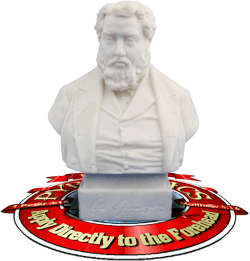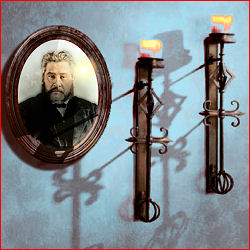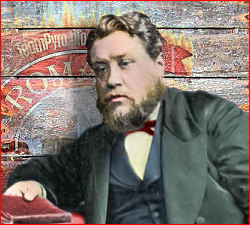by Dan Phillips
Sail carefully
In approaching the Old Testament believingly, two extremes must be avoided.

Off to the left looms the
Scylla of
atomization. Each part of the Bible is treated as a standalone, an historical artifact written virtually without reference to any other part. If the human author is allowed some awareness of previous revelation, no greater purpose — no metanarrative — is seen as useful (let alone determinative) in interpretation.
The problem with this approach is that it, in effect, rejects the Bible's self-description as a unified and organic revelation, in which the parts are best understood when set within the whole (e.g. Matthew 22:29; Mark 12:24; Luke 24:44-48; John 7:42; 20:9; 1 Timothy 5:18; Hebrews 1:1-2, etc.).
The unity of the Bible is not only a significant fact for doctrine, but for interpretation as well.
Equally, off to the right is the jutting
Charybdis of a
false Christianization of the Old Testament.

Note: I am not saying that reading the Bible as a Christian book is false. Indeed, I think it false to read it any other way (though what I mean by that would require expansion beyond the purpose of this post). However, the ultimacy of Christ does not cancel out the relevance of each chapter of revelation within and to its own context.
We commit this error when we neglect the fact that the God who finally spoke "to us by his Son" had previously spoken "
to our fathers by the prophets" (Hebrews 1:1-2). We effectively deny this fact if we take, as our primary interpretation of any passage, a meaning that the passage
could not possibly have had either to the writer nor the readers. If God spoke hopelessly over the heads of both His prophets and His hearers/readers, you couldn't say that He spoke "
to our fathers," and you couldn't call what He did "communication." It doesn't honor God to depict Him as, in effect, running the ultimate shell-game.
Having said that: the approach that is (I think) truest to the whole picture of revelation must suggest meanings that would make sense to the original writers/readers,
and relate to the ultimate Big Picture that lay in the mind of God.
As an illustration, let's take the doctrine of the substitutionary atonement as it relates to the book of Proverbs.
"This should be interesting," some of you will doubtless say, "— since there
is no doctrine of

substitutionary atonement in Proverbs!" At one point, that would also have been pretty much the entirety of my own reaction.
I'd certainty agree that no one
could build an entire doctrine of the atonement from Proverbs. But I'd also hasten to insist that no one
should build an entire doctrine of the atonement from
any single book of the Bible, including Romans and Galatians.
However, I do think that Proverbs contains at least
two signposts that, in the context of the whole Canon, point us in the direction of the canonical doctrine of penal, substitutionary atonement.
Let me illustrate, then, by expanding a portion of a sermon I recently preached to the good folks at
Calvary Community Church in Louisville, TN.
First signpost: "Yahweh"
The first signpost is broadly missed, or undervalued, for a couple of reasons.
First, nobody's helped by the
stupid translators' trick of hiding "Yahweh" behind "LORD" and "GOD." We are
so overdue for some head of a translation committee to look his fellow-scholars in the eye and say, "Brothers... why do we even
do this anymore? We all know it's wrong, none of us can really make sense out of it. The more that people know, the lamer the 'explanations' in our forwards are sounding — so seriously, let's ditch that whole embarrassing LORD / Lord GOD thing, and let the text say 'Yahweh.'" And then everyone else on the committee needs to vote a hearty "Aye," stop baffling generations of Bible-readers, and start making up for lost time.
If this issue doesn't resonate with you, then try this: imagine that every occurrence of "Jesus" in the NT were replaced with "the Teacher" or "the Lord," because some group of unbelievers has a superstition about even saying His name. Maybe then the point will begin to stand out more starkly to you.
Second, because of this, too few reflect sufficiently on the
significance of the fact that the living God of the Bible has a personal name, and that this
means
something. All sorts of religions talk about at least one "lord" and/or "god," so we don't stop to think when we see "LORD" in the text.
But we really should. Especially we
plenary, verbal inspiration-types.
Actually, Proverbs is rather remarkable in this regard. Proverbs is different from much of the Old Testament in terms of the mode of revelation. Here we don't see oracles of Yahweh, or "thus says Yahweh," as in other books. Instead, this kind of "wisdom" literature is seen in other contemporary (and older) cultures, and the sage's laboratory is the world of observation and reflection.
We see this in Proverbs 24:30-34 —
I passed by the field of a sluggard,
by the vineyard of a man lacking sense,
31 and behold, it was all overgrown with thorns;
the ground was covered with nettles,
and its stone wall was broken down.
32 Then I saw and considered it;
I looked and received instruction.
33 A little sleep, a little slumber,
a little folding of the hands to rest,
34 and poverty will come upon you like a robber,
and want like an armed man.
Verse 32 might be rendered a bit more literally: “Then I myself gazed, I applied my mind, I saw, I received an education.” The insight of revelation comes not from a vision or a voice, but through observation and reflection.
Now, given the nature of wisdom literature, and given its provenance in the world of nature and society, what name of God might you
guess would dominate: the more generic, general-revelation name "God"? Or the very specific, special-revelation, Israelitish name "Yahweh"? I would have guessed the former.
I would have been wrong.
In fact, whereas words translated "God" occur only about
eight times in Proverbs, the name "Yahweh" occurs
eighty-seven times -- about the same proportion as the (very Yahwistic) book of Deuteronomy (cf. Bruce Waltke, "The Book of Proverbs and Old Testament Theology."
Bibliotheca Sacra, 136, No. 544 [1979], p. 305).
"What," you ask, patience finally waning, "does the prevalence of the name 'Yahweh' have to do with substitutionary atonement?"
What kind of God is Yahweh?
I would make the argument that
Yahweh is by definition the God of penal, substitutionary atonement. Without repeating works such as Leon Morris' well-nigh epochal
The Apostolic Preaching of the Cross,
the worship of Yahweh prominently feature d substitutionary atonement from its very first breaths.
d substitutionary atonement from its very first breaths.
Consider: Adam and Eve sinned, and
Yahweh immediately informs them that a Seed of the woman (!) would defeat the serpent through
bloody suffering (Genesis 3:15; snake-bit heel =
bloody heel); and at least one animal's
blood was shed to cover their shame (v. 21; skinned animal =
bloody animal). The faith of believing Abel moves him to make
blood sacrifice which
Yahweh accepts, while He rejects Cain's bloodless (and faithless) sacrifice (closely compare Genesis 4:1-5 with Hebrews 11:4's "more acceptable sacrifice," before too hastily dismissing the
bloody element).
When
Yahweh formalized His covenant with Abram, what means did He choose? The
bloody covenantal formalities of Abram's day (Genesis 15).
Surely no Pyro reader needs me to make the point that Israel's worship of Yahweh was
blood-spattered, in a vivid depiction of penal, substitutionary atonement, from start to finish?
Yahweh's covenant with Israel is inaugurated with
blood (Exodus 24:5-8).
And after a series of commands which Israel is urged to obey (Exodus 20-24),
Yahweh immediately begins giving instructions as to what to do in view of the certainty that they
will not obey. That is, He directs the construction of the Tabernacle and the institution of the priesthood (Exodus 25ff.). And what is the primary function of the Tabernacle? The worship of
Yahweh by the offering of
bloody, substitutionary sacrifices (among others; detailed in the book of Leviticus). Thus the writer to the Hebrews could rightly say in 9:22 that "under the law almost everything is purified with blood, and without the shedding of
blood there is no forgiveness of sins."
In fact, the truth is expressed clearly in the central, clarifying text of Leviticus 17:11 — "For the life of the flesh is in the blood, and I have given it for you on the altar to make atonement for your souls, for it is the blood that makes atonement by the life. " That is what "
Yahweh spoke to Moses" (17:1).
Accordingly, what is "
blood" in these Biblical contexts if not shorthand for
penal, substitutionary atonement?
Bringing it to Proverbs
Putting this together: a textually-respectful, whole-Bible reading of Proverbs will see each mention of
Yahweh as equivalent to saying
"the God of Israel, who can be believingly approached only on the basis of penal, substitutionary atonement."
Therefore, I would argue, just as each use of
Jesus by NT writers is theologically "loaded," so it is with uses of
Yahweh in the OT. No matter the proverb's subject, this is who Yahweh is: He is the God of penal, substitutionary atonement. It would be legitimate (if stylistically reprehensible) thus to gloss proverbs:
A false balance is an abomination to [Yahweh, the God of penal, substitutionary atonement],
but a just weight is his delight (Proverbs 11:1)
The name of [Yahweh, the God of penal, substitutionary atonement] is a strong tower;
the righteous man runs into it and is safe (Proverbs 18:10)
The
purpose of Proverbs is expressly stated to be the acquisition and practical living out of God's viewpoint (Proverbs 1:1-6), so one will not expect a focused doctrinal exposition
per se. However, when Proverbs 1:7 says that absolutely everything is based and built on the
fear of Yahweh, we now understand that Solomon means the
fear of Yahweh, the God who can be approached only through faith and on the basis of penal, substitutionary atonement.
In sum, then: the
first signpost is in
Solomon's use of God's name "Yahweh." The OT knows of
no Yahweh who
is not the God approached by faith on the basis of penal, substitutionary atonement.
In the next installment, I plan to examine a verse that directs us towards the atonement in a surprising manner; then to bring both posts together in a concluding statement.
UPDATE: part two.

 No punishment required?
No punishment required?
 couple of Brit-bloggers, Steve and Sven, both noticed Monday's Spurgeon quote and voiced doubts about whether Spurgeon really believed in the penal-substitution view of the atonement.
couple of Brit-bloggers, Steve and Sven, both noticed Monday's Spurgeon quote and voiced doubts about whether Spurgeon really believed in the penal-substitution view of the atonement.These are the new men whom God has sent down from heaven, to tell us that the apostle Paul was all wrong, that our faith is vain, that we have been quite mistaken, that there was no need for propitiating blood to wash away our sins; that the fact was, our sins needed discipline, but penal vengeance and righteous wrath are quite out of the question. When I thus speak, I am free to confess that such ideas are not boldly taught by a certain individual whose volume excites these remarks, but as he puffs the books of gross perverters of the truth, I am compelled to believe that he endorses such theology.




 the text by inserting ideas inaccessibly alien to its human authors or readers, nor
the text by inserting ideas inaccessibly alien to its human authors or readers, nor  for
for  The
The  crimes (Isaiah 66:3; Jeremiah 11:15). Solomon himself brought scorching barrages to bear on anyone who viewed sacrifice as being an externalistic "fix" for an unrepentant, unbelieving heart (Proverbs 15:8; 21:27).
crimes (Isaiah 66:3; Jeremiah 11:15). Solomon himself brought scorching barrages to bear on anyone who viewed sacrifice as being an externalistic "fix" for an unrepentant, unbelieving heart (Proverbs 15:8; 21:27). and devastating denunciation of Israel's abuse of ritual and sacrifice to cover over their unbelieving lives (Isaiah 1:10-15). Yet I've long envisioned a contemporary of Isaiah's reading those words and thinking, "Yahweh doesn't want sacrifice? What does that leave us?"
and devastating denunciation of Israel's abuse of ritual and sacrifice to cover over their unbelieving lives (Isaiah 1:10-15). Yet I've long envisioned a contemporary of Isaiah's reading those words and thinking, "Yahweh doesn't want sacrifice? What does that leave us?"
 It was well that Thomas Watson called redemption “the masterpiece of divine wisdom.” Watson envisions the counsels of eternity thus:
It was well that Thomas Watson called redemption “the masterpiece of divine wisdom.” Watson envisions the counsels of eternity thus: Off to the left looms the
Off to the left looms the 
 substitutionary atonement in Proverbs!" At one point, that would also have been pretty much the entirety of my own reaction.
substitutionary atonement in Proverbs!" At one point, that would also have been pretty much the entirety of my own reaction. something. All sorts of religions talk about at least one "lord" and/or "god," so we don't stop to think when we see "LORD" in the text.
something. All sorts of religions talk about at least one "lord" and/or "god," so we don't stop to think when we see "LORD" in the text.

 by Frank Turk
by Frank Turk


 ust as they say fish go bad at the head first, so modern divines generally go bad first upon the head and main doctrine of the substitutionary work of Christ. Nearly all our modern errors, I might say all of them, begin with mistakes about Christ.
ust as they say fish go bad at the head first, so modern divines generally go bad first upon the head and main doctrine of the substitutionary work of Christ. Nearly all our modern errors, I might say all of them, begin with mistakes about Christ. "Other foundation can no man lay than that is laid, which is Jesus Christ." On this rock there is security. We may be mistaken on any other points with more impunity than this. They who are builded on the rock, though they build wood, and hay, and stubble, thereupon to their sore confusion, for what they build shall be burned, themselves shall be saved yet so as by fire.
"Other foundation can no man lay than that is laid, which is Jesus Christ." On this rock there is security. We may be mistaken on any other points with more impunity than this. They who are builded on the rock, though they build wood, and hay, and stubble, thereupon to their sore confusion, for what they build shall be burned, themselves shall be saved yet so as by fire.

 om Wright has posted a screed on the atonement controversies.
om Wright has posted a screed on the atonement controversies.
 s forgiveness from sin grounded only in the love and mercy and goodness of God—apart from his justice? Does love alone prompt the Almighty to forego the due penalty of sin, wipe out the record of our wrongdoing, and nullify the claims of justice against us, unconditionally?
s forgiveness from sin grounded only in the love and mercy and goodness of God—apart from his justice? Does love alone prompt the Almighty to forego the due penalty of sin, wipe out the record of our wrongdoing, and nullify the claims of justice against us, unconditionally? Or must God Himself be propitiated? In other words, do His righteousness and His holy wrath against sin need to be satisfied before He can forgive?
Or must God Himself be propitiated? In other words, do His righteousness and His holy wrath against sin need to be satisfied before He can forgive? Our thoughts about such things are almost always too shallow. We take God's mercy for granted and ignore His holy justice. But a right view of God will always exalt His righteous hatred for sin as much as it magnifies His love and mercy. God's mercy is not some maudlin sentiment that causes Him to forget about His holiness and set aside His righteous anger against sin. The demands of righteousness must be fully and completely satisfied if God is ever going to forgive sin. He cannot and will not simply overlook sin as if it didn't really matter.
Our thoughts about such things are almost always too shallow. We take God's mercy for granted and ignore His holy justice. But a right view of God will always exalt His righteous hatred for sin as much as it magnifies His love and mercy. God's mercy is not some maudlin sentiment that causes Him to forget about His holiness and set aside His righteous anger against sin. The demands of righteousness must be fully and completely satisfied if God is ever going to forgive sin. He cannot and will not simply overlook sin as if it didn't really matter. The
The  n the excerpt below, Spurgeon was sounding an alarm against early modernist tendencies. Specifically, he was answering those who recoiled from the truth that God requires a blood atonement as the price of forgiveness. "The idea that God must be propitiated by blood makes Him seem too harsh," the modernists argued. Genteel Victorians, whose sensibilities were offended merely by the sound of the word blood, were inclined to agree.
n the excerpt below, Spurgeon was sounding an alarm against early modernist tendencies. Specifically, he was answering those who recoiled from the truth that God requires a blood atonement as the price of forgiveness. "The idea that God must be propitiated by blood makes Him seem too harsh," the modernists argued. Genteel Victorians, whose sensibilities were offended merely by the sound of the word blood, were inclined to agree.
 e who reads the Bible with the eye of faith, desiring to discover its hidden secrets, sees something more in the Saviour's death than Roman cruelty, or Jewish malice: he sees the solemn decree of God fulfilled by men, who were the ignorant, but guilty instruments of its accomplishment. He looks beyond the Roman spear and nail, beyond the Jewish taunt and jeer, up to the Sacred Fount, whence all things flow, and traces the crucifixion of Christ to the breast of Deity.
e who reads the Bible with the eye of faith, desiring to discover its hidden secrets, sees something more in the Saviour's death than Roman cruelty, or Jewish malice: he sees the solemn decree of God fulfilled by men, who were the ignorant, but guilty instruments of its accomplishment. He looks beyond the Roman spear and nail, beyond the Jewish taunt and jeer, up to the Sacred Fount, whence all things flow, and traces the crucifixion of Christ to the breast of Deity.








